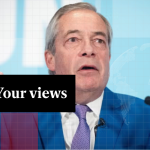The row over Gary Lineker’s tweet criticising the UK government’s proposed asylum legislation has re-ignited the debate about impartiality in journalism and the way news organisations deal with social media.
The BBC now looks set to review its social media policies again (it last did this in 2020). This decision is in line with a wider international media effort. In 2022, the UK Guardian revised its 2018 policies to include language on disciplinary action after a row involving its journalists spilled over onto Twitter.
The Washington Post updated its policies a month later after another high-profile Twitter clash which drew in multiple Post staffers and resulted in the firing of one reporter and the suspension of another.
In 2020, the BBC revised its 2019 guidelines after a row over “virtue signalling” saying that staff could not use activist hashtags or retweets “no matter how worthy the cause or how much their message appears to be accepted or uncontroversial”.
And in a situation which echoes the current BBC brouhaha, the US sports giant ESPN revamped its guidelines in 2017 after suspending TV anchor Jemele Hill for tweeting that then-president Donald Trump was racist. Like Lineker, Hill worked in sports rather than news – but ESPN said it needed to revisit the guidelines to make sure that all employees, no matter the field, were aware of the new expectations around impartiality on social media.
ESPN’s 2017 guidelines were markedly different to their 2011 policies which, like many others, were focused more on maintaining control of content than concerns about political commentary. It’s difficult to comprehend now, but news outlets initially declined to set formal policies. Most have tended to use what the BBC used to see as its “common sense” approach. This was that reporters should refrain from posting anything “that would embarrass them personally or professionally or their organisation”. This hands-off style of guidance was perhaps best symbolised by the reluctance of The New York Times to set any policy at all.
The BBC, like many news organisations surveyed here, is in a different place now. The concerns about reputational damage are driving policy to the point that a survey I conducted of 13 mainstream news organisations in the US, Canada, the UK, and Ireland shows that impartiality is the primary theme among a wide swath of news organisations. The list includes state broadcasters (RTÉ, CBC, BBC and NPR), commercial broadcasters (Sky), centre-right tabloids (Globe and Mail, Daily Express/Daily Star), centre-left broadsheets (The Guardian and The New York Times) as well as wire agencies (Reuters and AP), sports news (ESPN) and digital (BuzzFeed).
Impartiality
Impartiality informs every aspect of the guidelines – from obvious pursuits such as commentary to relatively innocuous activities such as “liking” content and retweets. The rules appear to be pretty consistent across regions and types of media outlet.
In the US, the independent non-profit media organisation NPR emphasises the importance of avoiding revealing “personal views on a political or other controversial issue”. Irish state broadcaster RTÉ, meanwhile, warns against showing “bias on current topics” and in the UK the BBC cautions against sharing “views on any policy which is a matter of current political debate”.
In Canada, the Globe and Mail says it’s fine to express views in private but any “political or partisan views which go beyond your public-facing role should not be expressed in public”. ESPN is a bit more nuanced, requesting that employees “do nothing that would undercut your colleagues’ work or embroil the company in unwanted controversy”.
But the overriding concern among all news organisations is that any partisan opinions or political views will damage the specific news organisation’s reputation as a source of news and bring them into disrepute.
The problem, as far as the news organisations see it, is that every action of their employees is connected to their workplace. So their social media posts, likes, and shares can be viewed as representing an official position of the organisation. ESPN reminds its employees that “at all times you are representing ESPN, and social sites offer the equivalent of a live microphone”.
RTÉ says that employees are always considered public representatives of the organisation and the Guardian and its stablemate The Observer says that such restrictions extend to every employee associated with their organisation, whether staff or freelance, but particularly those with large followings.
Retweets
Retweets, as the BBC puts it, are typically viewed as “an expression of opinion on social media”. It’s a comment echoed by the Daily Express/Daily Star which describes them as “an endorsement of the original tweet”.
The Guardian and The New York Times say retweets can reveal “personal prejudices and opinions,” which could raise doubts about a journalist’s ability to cover news events fairly and impartially. As NPR cautions, journalists should not assume that their retweets will not be seen as reflecting their own views: “Don’t assume it’s not going to be viewed that way.”
Liking and friending
Retweets, likes, and friending activities are also considered suspect. The BBC warns against “revealed bias”, in liking and reposting other people’s messages. RTÉ cautions that “liking and following accounts may make other users think those accounts are more trustworthy or that you endorse them”.
The Guardian warns that likes “can easily become public and may be seen as representing an official GNM position”. This is a sentiment echoed in the US where The New York Times emphasises that “everything we post or ‘like’ online is to some degree public. And everything we do in public is likely to be associated with The Times”.
Disclaimers or separate accounts
Overall, while the guidelines highlight the concerns around impartiality on social media they also highlight the absence of guardrails for journalists using any of these platforms. There is no “un-send” button on social media and frequently used strategies such as disclaimers or private accounts are discouraged with all news outlets saying that neither can help in mitigating negative publicity.
The BBC specifically says that there is no difference between how personal and official accounts are perceived on social media – so it will be interesting to see how the UK public broadcaster’s new guidelines further tighten up what is already a fairly restrictive environment.
Kelly Fincham does not work for, consult, own shares in or receive funding from any company or organisation that would benefit from this article, and has disclosed no relevant affiliations beyond their academic appointment.










